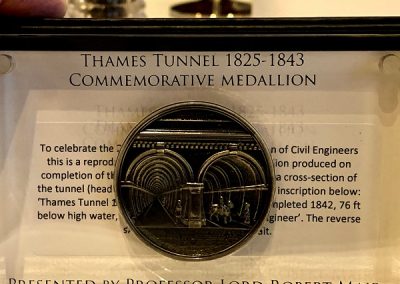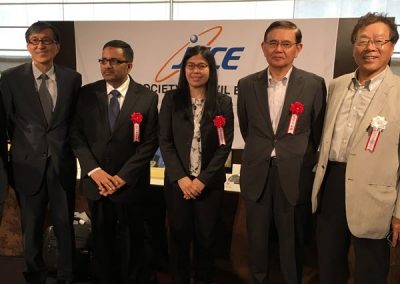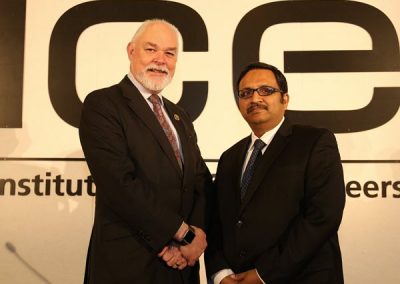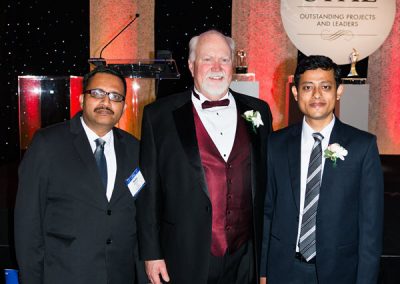Dr. A.F.M. Saiful Amin
Professor of Civil EngineeringBroad areas of specialization
- Structural engineering
- Structural mechanics
- Continuum mechanics, Thermodynamics, Thermophysics
- Modeling nonlinear material behavior under large deformation
- Experimental mechanics
- Finite element implementation of constitutive models
- Cement chemistry
- Forensic engineering
- Engineering Education
- Accreditation
Education
2001
Doctor of Philosophy
Graduate School of Science and Engineering
Saitama University, Japan.
1998
Master of Science in Civil Engineering
Bangladesh University of Engineering and Technology
1996
Bachelor of Science in Civil Engineering
Bangladesh University of Engineering and Technology
Professional memberships
- Fellow, Institution of Engineers, Bangladesh
- Fellow, Institution of Civil Engineers, United Kingdom
- Fellow, International Association for Bridge and Structural Engineering
- Fellow, Bangladesh Society for Geotechnocal Engineering
- Fellow, Bangladesh Earthquake Soceity
- Member, Asian Center for Engineering Computations and Software, AIT, Thailand
- Member, American Society of Civil Engineers
Present positions
Professor
Department of Civil Engineering
Bangladesh University of Engineering and Technology
Director
BUET-Japan Institute of Disaster Prevention and Urban Safety
Bangladesh University of Engineering and Technology
Chairman (Acting) & Vice Chairman
Board of Accreditation for Engineering and Technical Education
Institution of Engineers, Bangladesh
Self portrait
Professor Dr. Saiful Amin’s work has certain characteristics like embracing modern innovative thinking, doing research-based professional work for the welfare of humanity, working constructively, and working with the young and the old. He believes that the success of a leader lies in making timely decisions by abandoning a singular vision when necessary and properly evaluating team members’ opinions. The correct engineering decision depends on this. He says, “I try to make the present more beautiful and flawless by learning from past failures. I am fortunate that I came in close contact with famous people. While working in various places and organizations, both at home and abroad, I was loved and trusted by renowned teachers, researchers, engineers, employees, and leaders. I was able to get very close to them. I have learned a lot from them about different philosophies, lifestyles, and the local and global scope of work. They have enriched my life as a teacher, researcher, and professional. Proximity to them has inspired me to incorporate human qualities into my work.”
The main objective of outcomes-based education system is to make the engineer suitable for the needs of the society and the age; to bridge the gap between education and industry. The engineering education system must be tailored according to the needs of the engineering industry, and the engineering industry grows by meeting the needs of society. To make the engineering education system suitable for the present and future engineering industry as well as the forthcoming Fourth Industrial Revolution, there is no substitute for outcome-based education.
About his plans, Professor Dr. Saiful Amin said, “I want to do my best for any need of the country. Whether as an engineer or a teacher, I would like to do research for the country and participate in making policies for the engineering profession and engineering education. I want to see Bangladesh as a happy, prosperous, and safe country. Our forefathers made sacrifices in the War of Independence, the benefits of which we are now enjoying. The present society has to make sacrifices to build the nation. Then, the next generation will be able to reap the rewards.”
Featured publications
Legacy articles
- Amin, A. F. M. S. (2021). Structure to Bridge Creation Hubs During the Pandemic, Editorial, Structural Engineering International, 31(1), 5. DOI: 10.1080/10168664.2021.1863652.
- Amin, A. F. M. S., Hasnat, A., Khan, A. H., & Ashiquzzaman, M. (2016). Residual cementing property in recycled fines and coarse aggregates: Occurrence and quantification. Journal of Materials in Civil Engineering, 28(4). DOI: 10.1061/(ASCE)MT.1943-5533.0001472
- Amin, A.F.M.S., Haque, M.M., Siddiqi, M.Z.R., Rahman, M.A., Islam, M.S., & Alam, M. K., (2012) Use of selected silica deposits of Bangladesh as standard sand in testing compressive strength of hydraulic cement mortars: A proposal for strength correlation, Journal of Civil Engineering, IEB, Journal of Civil Engineering (IEB), 40 (2), 181-202.
- Amin, A.F.M.S., Lion, A., Hofer, P., (2010). Effect of Temperature History on the Mechanical Behavior of a Filler-Reinforced NR/BR Blend: Literature Review and Critical Experiments, Journal of Applied Mathematics and Mechanics / Zeitschrift fur Angewandte Mathematik und Mechanik, 90(5), pp. 347-369.
- Amin, A.F.M.S., Wiraguna, S.I., Bhuiyan, A.R., Okui, Y. (2006b). Hyperelasticity model for FE analysis of natural and high damping rubbers in compression and shear, J. Engrg. Mech., ASCE, 132(1), 54-64.
Permalink: http://dx.doi.org/10.1061/(ASCE)0733-9399(2006)132:1(54) - Amin, A.F.M.S., Lion, A., Sekita, S., Okui, Y., (2006a). Nonlinear dependence of viscosity in modeling the rate-dependent response of natural and high damping rubbers in compression and shear: Experimental identification and numerical verification, Int. J. Plast., 22(9), 1610-1657.
- Amin, A.F.M.S., Alam, M.S. and Okui, Y. (2002). An improved hyperelasticity relation in modeling viscoelasticity response of natural and high damping rubbers in compression: experiments, parameter identification and numerical verification, Mechanics of Materials, 34, 75-95.






